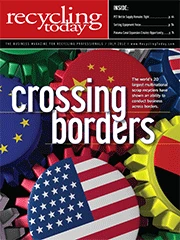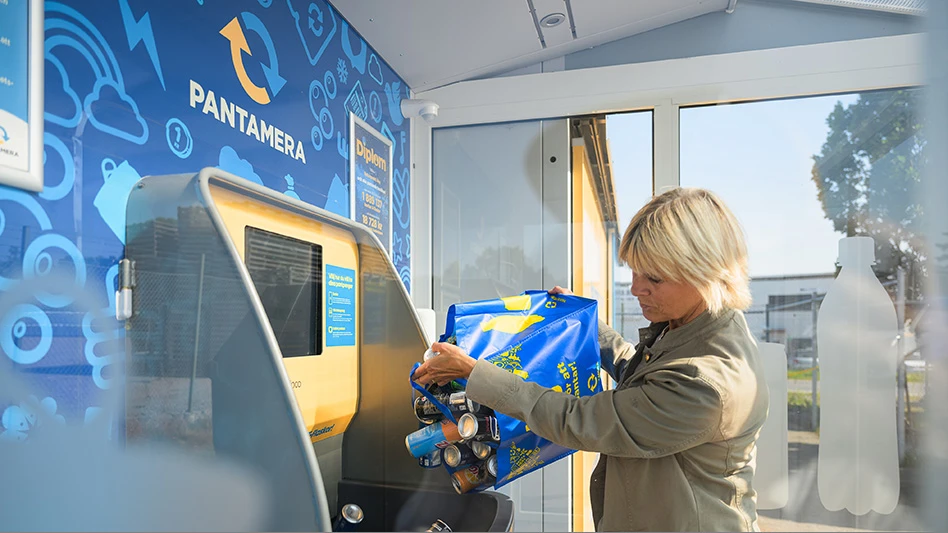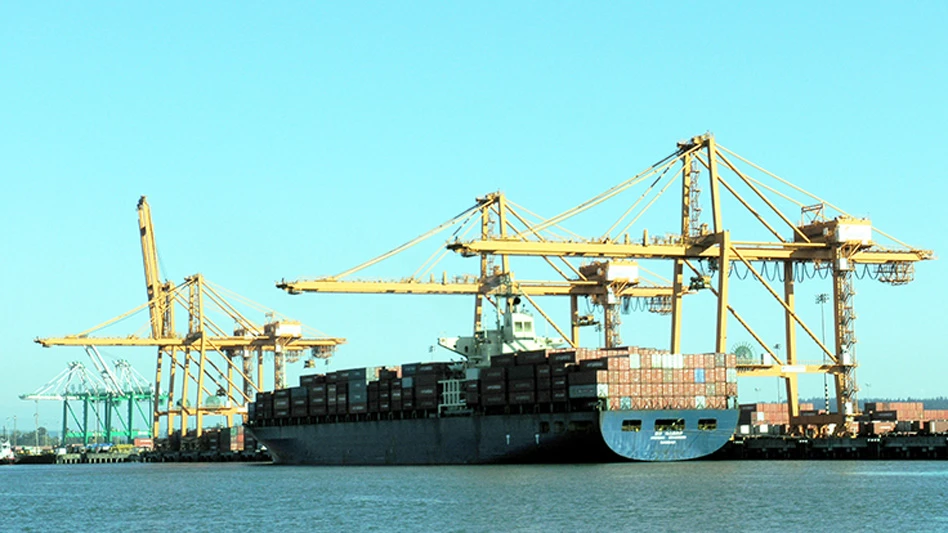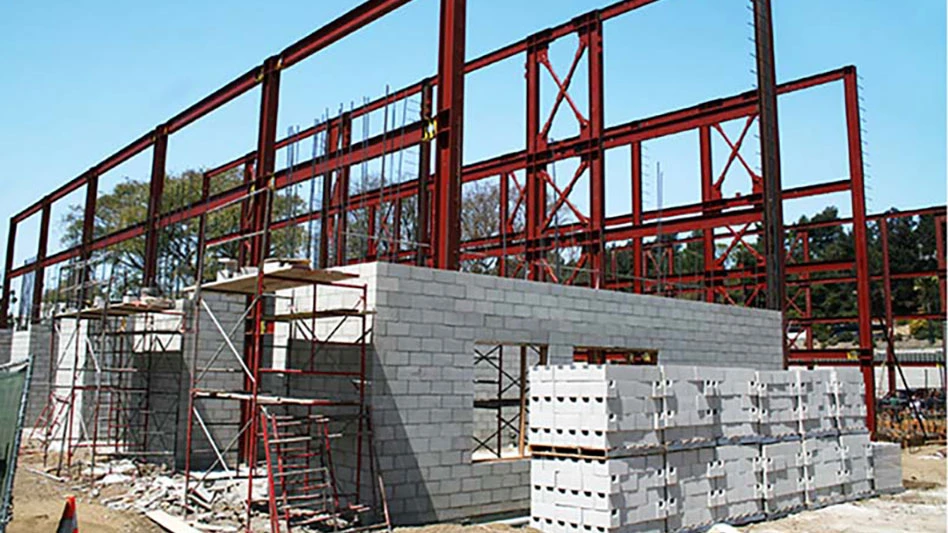 To see the full Largest multinational scrap recyclers list, click image above. To see the full Largest multinational scrap recyclers list, click image above. |
Recyclers are among the groups of people least likely to need a reminder that in 2012 the economy is as global and internationally inter-dependent as it has been at any time in history.
As it did in 2008 and 2009, the Recycling Today Media Group has compiled a list of the 20 largest multinational scrap companies. Considering that nearly every scrap company ships material across borders, the criterion to be considered “multinational” is to have a processing facility in more than one nation.
The amount of ferrous scrap physically handled and processed has been used to determine the rank of the companies.
The companies listed operate on every continent of the world and are based throughout different parts of the world.
Hungry furnaces
As measured by the WorldSteel Association (WorldSteel), Brussels, except in years when there is a sharp global economic downturn, the past dozen years are a story of unbridled growth for the steel industry.
Steelmakers in the 62 countries that report to WorldSteel made some 635 million metric tons of steel in the first five months of 2012. At that pace, they will have churned out some 1.52 billion tons at the end of the year. (This figure is nearly identical to the 1.51 billion tons produced in 2011.)
The Ferrous Division of the Brussels-based Bureau of International Recycling (BIR) tracks that figure and several others in its annual “World Steel Recycling in Figures” brochure.
The BIR booklet (available at www.bir.org/assets/PressReleases/ 416RomeFerrous-Statistics.pdf) not only offers pertinent steel production figures but also delves into global ferrous scrap collection, flows and consumption.
The amount of scrap that crosses international borders is a factor in many of the charts and tables presented within the booklet, which points to some of the underlying reasons why a scrap processing company may wish to maintain a presence in more than one nation.
In 2011, the BIR drew upon several sources to determine that these nations imported the most ferrous scrap (in metric tons):
- Turkey, 21.5 million;
- South Korea, 8.6 million;
- China, 6.8 million;
- India, 5.8 million (est.); and
- Taiwan, 5.3 million.
The active steel mills of these nations have helped build the infrastructures and make possible the rapid urbanization of Asia’s fastest-growing economies.
India’s and China’s mills serve their domestic market and those in some adjoining nations, while Turkish mills in part fuel the construction boom in the Persian Gulf region. Mills in South Korea and Taiwan serve their domestic markets while also importing to rapidly developing nations in East Asia, including China.
While these mills depend on imported scrap to feed their furnaces, the obsolete automobiles, appliances and structures of the developed world are being processed as scrap—with a double-digit percentage of this material being shipped overseas.
A list of the leading nations when it came to exporting ferrous scrap in 2011 points to their being on a similar place on the curve of economic development. The 2011 ferrous scrap exporters (in metric tons) were:
- United States, 24.4 million;
- Japan, 5.4 million;
- Canada, 4.8 million;
- Russia, 4 million; and
- United Kingdom, 2.1 million.
In his foreword to “World Steel Recycling in Figures,” BIR Ferrous Division President Christian Rubach points to the active shipping patterns as a reason why the trade association spends considerable attention lobbying for free trade.
“The huge world trade in steel scrap underlines the need for a free raw materials market,” says Rubach. “Our industry lives from worldwide free trade, enabling us to correct the global imbalance between net scrap exporters and net scrap importers.”
|
Supply Strains on the Ferrous Front As delegates to the 2012 Bureau of International Recycling (BIR) World Recycling Convention arrived back home in early June, they were be met by a falling ferrous scrap market that has left many traders reeling. At the BIR Ferrous Division meeting in late May, the sectors of the steel industry that consume ferrous scrap (such as structural steel mills) was characterized as weak, but with other sectors remaining hungry for ferrous scrap. On the supply side as of May, noted Blake Kelley, who works at the New York offices of Sims Metal Management, there was “severe competition for unprepared scrap, as dealers are forced to reach out further to find supply volumes.” On the demand side, Taiwanese steelmakers “are currently struggling to sell enough volume at prices sufficient to offset recent increases in electricity and natural gas prices,” said Kelley. This could hurt demand from a nation he characterized as “an active buyer of both bulk and containerized [ferrous] scrap cargoes.” Tom Bird, who works for Van Dalen Recycling in the U.K., said purchases from Turkish mills in the first half of 2012 have at times occurred “at levels that disappointed.” Bird added, “The first five months of 2012 have been challenging,” but that “demand for scrap out of Europe remains strong, which is vitally important and a positive factor.” Should ferrous prices continue to drop, that could increase buying by Chinese mills, as occurred in 2009. Kelley noted that Chinese mills tend to import deep sea cargoes of ferrous scrap “when necessary or advantageous,” but that in 2012 “material margins for steelmakers [in China] are insufficient.” Andrey Moiseenko of Ukraine-based Ukrmet Ltd. told delegates that legal proceedings are creating the possibility that restrictions on ferrous scrap exports from Russia may soon ease. However, that scrap may not travel far. Moiseenko noted that there are around 5 million metric tons of new electric arc furnace steelmaking capacity being constructed in the Ukraine. Ferrous Division meeting guest speaker Barbara Fliess of the Organisation for Economic Cooperation and Development (OECD) referred to the steel industry as facing a “raw materials supply challenge” caused in part by export restrictions “that have become more frequent.” The Trade and Agriculture office of the OECD, for which Fliess works, has been gathering information on the restrictions. The OECD has found that around 73 export restrictions exist for raw materials such as semi-finished steel, iron ore, pig iron, coking coal and ferrous scrap. The OECD has begun a dialog with nations enacting these measures, says Fliess. The group’s position is that “trade policy is rarely an optimal instrument to address a domestic market failure; it is untargeted and has negative side effects.” The 2012 BIR World Recycling Convention was May 30-June 1 at the Rome Cavalieri Hotel in Italy. |
Imperfect Union
The stresses and strains in the relationship between nations in the European Union (EU) have received most of the attention in 2012. Less quietly and over the course of many years, however, business owners in the EU have clearly been taking advantage of their ability to conduct business more easily on the continent.
Eleven of the 20 companies on the list of the largest multinational scrap recyclers are either based in Europe or have a major presence there.
Whether using Germany, France, the United Kingdom or another nation as their springboard, several scrap processing companies have taken advantage of the EU open border agreement that now encompasses 27 nations to expand their geographic footprints.
Companies like the Scholz Group, EMR Ltd. and Derichebourg Environnement have, either through acquisition or by building new facilities, greatly expanded the circle from which they collect scrap to be processed.
Sweden-based Stena Metall Group proclaims on its website, “The Stena Metall Group has recycling operations in around 200 locations in Sweden, Norway, Denmark, Finland and Poland. That’s why we are never far away when you need our services.”
United Kingdom-based EMR Ltd. uses similar logic in text on its website, stating, “We have over 150 recycling centers worldwide and we can either take delivery at your nearest site or, for large quantities, come and collect from you, [helping] you meet your recycling targets, while maximizing your profits.”
New York-based Sims Metal Management also points to its global reach as a customer service advantage, saying it has operations in five countries providing a network of processing facilities, many with deep-water port access.
|
Qualifying Rounds In compiling a list of the largest multinational scrap recyclers, several key questions had to be asked and answered:
A. “Multinational” has been defined as companies with processing operations in more than one nation.
A. To address the single largest segment of the magazine’s readership, scrap metal was identified as the first segment of the market to be examined. Sponsored Content Labor that WorksWith 25 years of experience, Leadpoint delivers cost-effective workforce solutions tailored to your needs. We handle the recruiting, hiring, training, and onboarding to deliver stable, productive, and safety-focused teams. Our commitment to safety and quality ensures peace of mind with a reliable workforce that helps you achieve your goals.
A. The volume of ferrous scrap accepted for processing or shipment has been made the measuring stick. It enters the recycling stream by volume in greater amounts than any other metal, is heavily traded and is shipped long distances.
A. In this year’s list, stainless steel recycling companies were not included. Ideally, a separate list of the largest stainless steel recyclers can be the focus of a separate future list, as can lists of companies engaged primarily in processing such materials as nonferrous metal, recovered fibre and plastic scrap. Processing and trading on a global scale has been standard practice for the largest stainless steel scrap processors, with ELG Haniel Group, Cronimet and Keywell LLC all having facilities on more than one continent. Each of those firms may have made this list had stainless tonnage been included. One multinational firm with largely solid waste industry operations and roots, Suez Environnement, has made the list, while several others such as Veolia Environnement and Waste Management Inc. were in the running. These firms may handle more solid waste and recovered fiber by volume, but by collecting steel cans, appliances, electronic scrap, magnetic incinerator residue and in some cases operating scrap yards, their scrap metal volume adds up. |
Staying out there
Although price volatility in particular can cause companies with global operations to face difficult situations (exemplified by the situation in the fall of 2008), few multinational scrap companies are making public pronouncements regarding retreating from their international trading and processing activities.
It is uncertain which companies on this list will seek additional opportunities in other nations or which ones may back away from global diversification when a regional economic downturn hits.
The pattern during the past decade or longer certainly points to the scrap processing and trading arena as being one that will consist of plenty of cross-border trading.
The author is editorial director of Recycling Today and can be contacted at btaylor@gie.net. Senior Editor Dan Sandoval helped compile the information on this list. He can be reached at dsandoval@gie.net.
|
Making the list The wide spectrum of the recycling industry ultimately means that several multi-national lists would have to be compiled to pay proper attention to the recycling of nonferrous metals, paper and plastics. But even with a list concentrating primarily on iron and steel scrap, the difficulties of properly identifying deserving companies were many. Even with the breadth of information offered by the Internet, the barriers of language and reluctance by privately held companies to publicize their activities assured that some deserving companies are not appearing on the first edition of this list. The editors of the Recycling Today Media Group, as always, are happy to call upon its reading audience for help. If you know of or work for a company that qualifies for this list, please let us know and we will make sure we contact that company as well as letting our readers know about it. Editorial Director Brian Taylor can be contacted via e-mail at btaylor@gie.net or can be reached at 330-523-5324. |
Get curated news on YOUR industry.
Enter your email to receive our newsletters.

Explore the July 2012 Issue
Check out more from this issue and find your next story to read.
Latest from Recycling Today
- CP Group announces new senior vice president
- APR publishes Design Guide in French
- AmSty recorded first sales of PolyRenew Styrene in 2024
- PRE says EU’s plastic recycling industry at a breaking point
- Call2Recycle Canada, Staples Professional expand partnership
- Circular Services breaks ground on north Texas MRF
- Tariff uncertainty results in choppy nonferrous scrap flows
- CATL, Ellen MacArthur Foundation establish battery partnership







